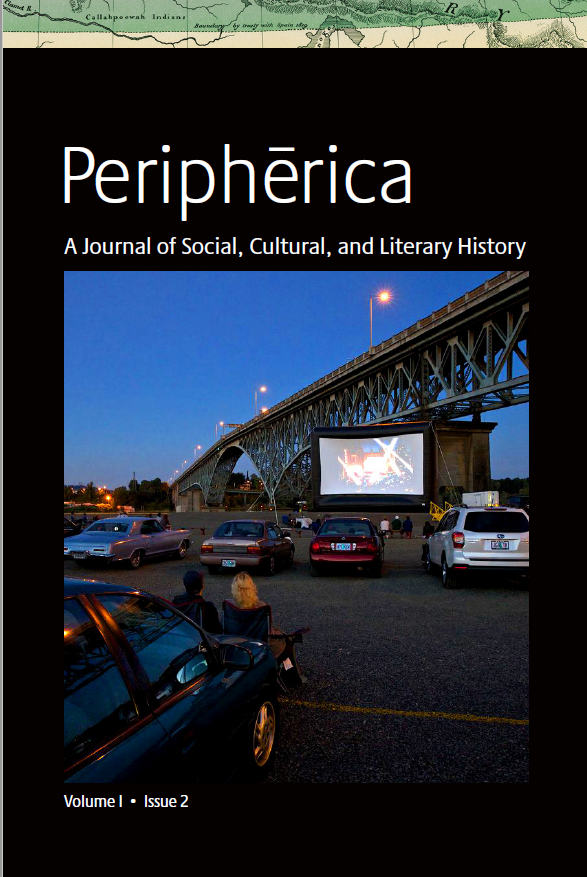From the Life to the Mind of the Writer in the Literary Biopic: Andrucha Waddington’s <i>Lope</i> and Ray Loriga’s <i>Teresa</i>
DOI:
https://doi.org/10.5399/uo/peripherica.1.2.13Resumen
Lope (Andrucha Waddington 2010) y Teresa (Ray Loriga 2007) tienen mucho encomún. Ambos biopics se centran en una figura literaria venerada de las letras españolas del Siglo de Oro. Sin embargo, a pesar de las muchas características que comparten, estas películas encarnan dos tendencias distintas en el género del biopic literario contemporáneo: una más “típica”, representada por Lope, que se centra fuertemente en el desarrollo de la trama y otra, representada por Teresa, que aspira a trasladar visualmente a la pantalla los aspectos que se relacionan con la interioridad del personaje principal. Aunque Teresa tiene rasgos del biopic literario contemporáneo “típico”, innova significativamente el género al enfocarse en la mente del escritor más que en su vida. Loriga utiliza el lenguaje de la cinematografía para trasladar a la pantalla el imaginario y las cualidades afectivas del misticismo de Teresa de Ávila—la fuerza catalizadora de sus escritos—, creando así una película que enfatiza la imagen y las emociones por encima de la trama. Teresa aporta así una sensibilidad diferente al género del biopic literario, que se desvía de la fórmula más estándar. Centrarse en la mente del autor puede ser, en efecto, una nueva pauta para innovar el género del biopic, particularmente en su vertiente literaria. Finalmente, estas dos películas ilustran la necesidad de ampliar el discurso académico sobre el género del biopic literario contemporáneo, ya que adoptan y a la vez se desvían de la fórmula establecida por los biopics anglosajones.
Citas
ARTELOPE: Base de datos y argumentos del teatro de Lope de Vega. http://artelope.uv.es/basededatos/ Accessed 3 Aug. 2020.
Bingham, Dennis. “The Lives and Times of the Biopic.” A Companion to the Historical Film. Ed. Robert A. Rosenstone and Constantin Parvulescu. Oxford: Wiley-Blackwell, 2013. 233-54.
Bingham, Dennis. Whose Lives Are They Anyway? The Biopic As Contemporary Film Genre. Piscataway: Rutgers UP, 2010.
Buchanan, Judith, ed. The Writer on Film: Screening the Literary Authorship. New York: Palgrave, 2013.
Carmona, Alba. Las reescrituras fílmicas de la comedia nueva: Un siglo en la gran pantalla. Peter Lang, 2019.
Crespo Steinke, Carolin. “Travelling through the Centuries: The Intertextual Relationship between Shakespeare in Love, Molière and Young Goethe in Love.” English Text Construction, vol. 10, no. 1, 2017, pp. 59-77.
Custen, George Frederick. Bio/pics: How Hollywood Constructed Public History. New Brunswick: Rutgers UP, 1992.
Faulkner, Sally. A History of Spanish Film: Cinema and Society, 1910-2010. London: Bloomsbury, 2013.
García-Sánchez, M. Soraya. “Teresa, the Erotic Saint? A Journey to Paz Vega’s Acting in Theresa: The Body of Christ.” The Erotic in Context, edited by M. Soraya García-Sánchez, Cara Judea Alhadeff and Joel Kuennen, Inter-Disciplinary P, 2011, pp. 109-116.
Higson, Andrew. “Brit-lit Biopics, 1990-2010.” The Writer on Film: Screening the Literary Authorship. Ed. Judith Buchanan. Palgrave, 2013, pp. 106-20.
Higson, Andrew. English Heritage, English Cinema: Costume Drama since 1980. Oxford UP, 2003.
Lope. Dir. Andrucha Waddington. Perf. Alberto Ammann, Leonor Watling, and Pilar López de Ayala. Twentieth Century Fox Home, 2010. Film.
Lupo, Jonathan, and Carolyn Anderson. “Off-Hollywood Lives: Irony and Its Discontents in the Contemporary Biopic.” Journal of Popular Film and Television, vol. 36, no. 2, 2008, pp. 102-112.
Martín-Pérez, Celia. “A Woman for All Seasons: Teresa of Ávila on Spanish Screens.” Seeing in Spanish: From Don Quixote to Daddy Yankee — 22 Essays on Hispanic Visual Cultures. Ed. Ryan Prout and Tilmann Altenberg. Newcastle upon Tyne: Cambridge Scholars, 2011. 18-31.
Morley, S. Griswold, and Courtney Bruerton. “How Many Comedias Did Lope de Vega Write?” Hispania, vol. 19, no. 2, 1936, pp. 217-234. JSTOR, http://doi.org/10.2307/332239 Accessed 3 Aug. 2020.
“The Outlaw (2010).” Box Office Mojo, http://www.boxofficemojo.com/title/tt1186357/?ref_=bo_tt_ti Accessed 1 Aug. 2020.
Rosenstone, Robert A. History on Film/Film on History. Harlow, UK: Pearson, 2012.
Saint Teresa of Avila. The Complete Works of St. Teresa of Avila: Vol. 1. Translated and edited by E. Allison Peers, Burns & Oates, 2002. ProQuest Ebook Central.
Saint Teresa of Avila. The Complete Works of St. Teresa of Avila: Vol. 3. Translated and edited by E. Allison Peers, Burns & Oates, 2002. ProQuest Ebook Central.
Santa Teresa de Ávila. Escritos de Santa Teresa, añadidos é ilustrados por don Vicente de la Fuente, tomo I, Madrid, M. Rivadeneyra, 1861.
Shachar, Hila. “Authorial Histories: The Historical Film and the Literary Biopic.” A Companion to the Historical Film. Ed. Robert A. Rosenstone and Constantin Parvulescu. Hoboken: Wiley-Blackwell, 2013. 199-218.
Shachar, Hila. Screening the Author: The Literary Biopic. Palgrave Macmillan, 2019.
Smith, Greg M. Film Structure and the Emotion System. Cambridge UP, 2003.
Teresa, el cuerpo de Cristo [Theresa, the body of Christ]. Dir. Ray Loriga. Perf. Paz Vega, Leonor Watling, and Geraldine Chaplin. S.A.V., 2007.
“Theresa: The Body of Christ (2007).” Box Office Mojo, http://www.boxofficemojo.com/title/tt0458500/?ref_=bo_tt_ti Accessed 1 Aug. 2020.
“Theresa: The Body of Christ (2007).” IMDb, http://www.imdb.com/title/tt0458500/ Accessed 1 Aug. 2020.
Waddington, Andrucha. “Andrucha Waddington escribe sobre la experiencia de dirigir Lope.” Noticine.com, http://noticine.com/iberoamerica/36-iberoamerica/11495-andrucha-waddington-escribe-sobre-la-experiencia-de-dirigir-qlopeq.html Accessed 3 Aug. 2020.
Wheeler, Duncan. “Back to the Future: Repackaging Spain’s Troublesome Past for Local and Global Audiences.” (Re)viewing Creative, Critical and Commercial Practices in Contemporary Spanish Cinema, edited by Duncan Wheeler and Fernando Canet, Intellect, 2014, pp. 205-233.



